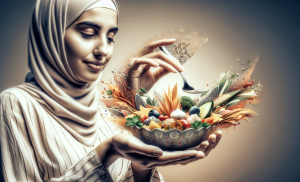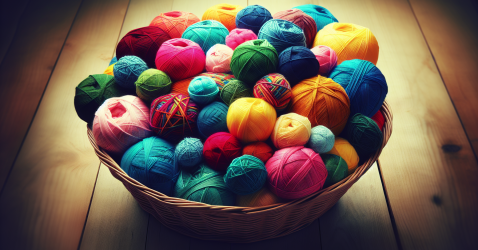Culinary Creativity: Cooking As A Form Of Self-Care
In our fast-paced world, finding moments of self-care and relaxation is essential for maintaining our well-being. One activity that has gained popularity in recent years is cooking. Not only is cooking a basic life skill, but it can also serve as a form of self-expression and mindfulness. By tapping into your culinary creativity, you can create delicious meals that nourish both your body and soul. In this article, we will explore how cooking can be a powerful tool for self-care and why it is worth incorporating into your life.
The Benefits of Cooking for Self-Care
Cooking for self-care can have numerous benefits for both the body and mind. By taking the time to prepare meals for yourself, you can reduce stress and anxiety, promote mindfulness, and boost self-esteem and confidence.
Reducing Stress and Anxiety
In today’s fast-paced world, stress and anxiety have become common issues that many people face. However, cooking can be a great tool for managing these emotions. When you cook, you are able to focus your attention on a specific task, allowing your mind to relax and unwind. The rhythmic chopping of vegetables or the stirring of a pot can be calming and provide a much-needed escape from the pressures of daily life.
Promoting Mindfulness
Cooking is an excellent way to practice mindfulness, which involves being fully present in the current moment. As you engage in the process of preparing a meal, you can bring your attention to the sights, sounds, smells, and textures around you. By immersing yourself in the experience of cooking, you can cultivate a sense of peace and inner tranquility.
Boosting Self-Esteem and Confidence
Preparing a delicious meal from scratch can be incredibly rewarding and can boost your self-esteem and confidence. When you cook, you have the opportunity to create something beautiful and nourishing with your own hands. Seeing the final product and receiving praise from others can give you a sense of accomplishment and pride, further enhancing your self-esteem.
The Therapeutic Nature of Cooking
Cooking is more than just a chore; it can be a therapeutic activity that provides a sense of control, a creative outlet, and brings joy and satisfaction.
Creating a Sense of Control
In a world where many things are beyond our control, cooking allows us to take charge of our own nourishment. By selecting the ingredients and deciding how to prepare them, we regain a sense of autonomy and control over our lives. This can be empowering and help us feel more grounded and in control.
Providing a Creative Outlet
Cooking is a form of creative expression. Just like painting or writing, it allows us to explore different flavors, textures, and techniques. We can experiment with ingredients, try new recipes, and develop our own unique style in the kitchen. This creativity provides an outlet for self-expression and can be a source of immense joy and satisfaction.
Bringing Joy and Satisfaction
There is something incredibly rewarding about creating a delicious meal and sharing it with others. The act of cooking can bring joy and delight, both to the cook and those who get to enjoy the fruits of their labor. Whether it’s the aroma of a dish simmering on the stove or the satisfaction of a perfectly plated dessert, cooking has a way of nourishing our souls and bringing us happiness.
How Cooking Nourishes the Body and Mind
Cooking not only nurtures our bodies but also enhances our mental well-being. It increases our awareness of ingredients, provides nutritional value, and enhances cognitive function.
Nutritional Value
When we cook our own meals, we have the power to choose fresh, wholesome ingredients that nourish our bodies. By avoiding processed foods and incorporating more fruits, vegetables, and whole grains into our cooking, we can ensure that we are providing ourselves with the necessary nutrients to maintain good health. Cooking also allows us to control the amount of salt, sugar, and unhealthy fats in our food, which can contribute to a balanced diet.
Increased Awareness of Ingredients
When we cook, we become more conscious of the ingredients we use and their impact on our health. We start paying attention to labels, reading about the benefits of different foods, and exploring new ingredients. This heightened awareness can lead to healthier food choices and a more mindful approach to eating.
Enhanced Cognitive Function
Cooking engages our brains in a variety of ways, stimulating cognitive function and keeping our minds sharp. We need to use our memory to recall recipes and techniques, our problem-solving skills to troubleshoot any issues that arise, and our creativity to come up with new and exciting dishes. By regularly challenging ourselves in the kitchen, we can enhance our cognitive abilities and improve our overall mental agility.
Exploring Culinary Creativity
Cooking provides the perfect opportunity to unleash your culinary creativity and explore different flavors, techniques, and cuisines.
Experimenting with Flavors and Techniques
One of the most exciting aspects of cooking is experimenting with different flavors and techniques. Whether it’s adding a pinch of exotic spices to a familiar dish or trying your hand at a new cooking method, the kitchen offers endless possibilities for culinary exploration. This experimentation allows you to broaden your palate, develop your own unique style, and create dishes that are truly your own.
Finding Inspiration from Different Cuisines
Cooking allows you to travel the world without leaving your kitchen. Exploring different cuisines and their unique flavor profiles can be an exciting and educational experience. By trying recipes from various cultures, you can expand your culinary horizons, learn about different ingredients and cooking techniques, and gain a deeper appreciation for the diversity of food around the globe.
Personalizing Your Recipes
Cooking is a deeply personal experience, and one of the joys of being in the kitchen is the freedom to personalize recipes to suit your taste and preferences. Whether it’s adjusting the spices, adding your favorite ingredients, or incorporating a twist of your own, cooking allows you to put your own stamp on every dish you create. This personalization not only ensures that your meals are tailored to your liking but also allows you to express your individuality through your cooking.
Cooking as a Meditative Practice
Cooking can be a meditative practice that allows you to focus on the present moment, engage your senses, and create rituals and traditions.
Focusing on the Present Moment
In a world filled with distractions and busyness, cooking provides an opportunity to slow down and be fully present. As you chop vegetables or stir a simmering pot, you can bring your attention to the task at hand, letting go of worries or preoccupations. This focus on the present moment can be incredibly grounding and can bring a sense of calm and peace to your mind.
Engaging the Senses
Cooking engages all of our senses, making it a rich and sensory experience. From the vibrant colors of fresh produce to the tantalizing aromas that waft through the kitchen, each sense is awakened and enlivened. The sounds of sizzling pans and the tactile sensation of kneading dough or rolling out pastry further deepens our connection to the cooking process. By engaging our senses in this way, we can fully immerse ourselves in the present moment and savor each step of the culinary journey.
Creating Rituals and Traditions
Cooking can be a way to create meaningful rituals and traditions in our lives. Whether it’s preparing a special meal for a holiday or gathering with loved ones to cook together, these shared experiences can create lasting memories and a sense of connection. Cooking rituals can also provide a sense of stability and routine in our lives, offering a moment of calm and familiarity in a chaotic world.
Connecting with Others through Food
Food has a unique ability to bring people together, and cooking provides an opportunity to connect with others through shared meals, potlucks, and cultural exchanges.
Sharing Meals with Loved Ones
One of the simple pleasures of cooking is sharing meals with loved ones. Gathering around the table to enjoy a home-cooked meal allows us to foster deeper connections and create meaningful bonds with those we care about. Whether it’s a casual weeknight dinner or a special celebration, sharing food with others creates a sense of togetherness and nurturing that can strengthen our relationships.
Building Community through Potlucks and Food Events
Cooking can also be a way to build community and create a sense of belonging. Organizing potlucks or attending food events allows you to connect with others who share a passion for culinary delights. These gatherings provide an opportunity to exchange recipes, learn from one another, and celebrate the diverse culinary traditions that exist within our communities.
Exploring Cultural Exchanges
Food is a powerful tool for exploring different cultures and fostering understanding. By cooking dishes from different cuisines, we can learn about the traditions, flavors, and stories of people from around the world. This exploration of diverse culinary traditions helps to break down barriers and promotes cultural exchange and appreciation.
Cooking as a Form of Self-Expression
Cooking offers a unique way to express ourselves and communicate our emotions. It allows us to experiment with food presentation, create signature dishes, and infuse our meals with our own personal touch.
Using Food to Communicate Emotions
Food has the power to evoke emotions, and cooking allows us to harness this power to communicate our feelings. Whether it’s baking a comforting cake to cheer up a friend or preparing a special meal to celebrate an achievement, cooking can be a way to express love, gratitude, joy, or any other emotion that words may fail to convey.
Experimenting with Food Presentation
Cooking is a creative endeavor that extends beyond the flavors and textures of a dish. Food presentation plays a crucial role in how we experience a meal. By experimenting with different plating techniques, garnishes, and arrangement styles, we can make each dish a work of art. This attention to presentation adds an extra layer of self-expression to our cooking and allows us to showcase our creativity.
Discovering Personal Signature Dishes
Through cooking, we can develop our own signature dishes that reflect our unique tastes and preferences. These dishes become an extension of ourselves, a culinary expression of our identity. By experimenting, adapting, and refining recipes over time, we can create dishes that resonate with our individuality and bring us a sense of pride and accomplishment.
The Role of Planning and Preparation in Cooking
Cooking requires careful planning and preparation, which can contribute to a more enjoyable and organized cooking experience.
Organizing Ingredients and Recipes
Before you can begin cooking, it’s important to organize your ingredients and recipes. Taking the time to gather all the necessary ingredients, measure them out, and organize them in the order in which they will be used can help streamline the cooking process. Similarly, having your recipes easily accessible and well-organized ensures that you can follow them without any unnecessary stress or confusion.
Setting Goals and Creating a Cooking Schedule
Setting goals and creating a cooking schedule can help you stay on track and make the most of your time in the kitchen. Whether it’s planning to try a new recipe each week or designating specific days for meal prep, having a clear plan in place can make cooking feel less overwhelming and more manageable. Additionally, setting goals allows you to track your progress and celebrate your achievements along the way.
Making Grocery Shopping a Pleasurable Experience
Grocery shopping is an essential part of cooking, and with the right mindset, it can become a pleasurable experience. Rather than viewing it as a mundane task, approach grocery shopping as an opportunity to explore new ingredients, discover seasonal produce, and engage with your local community. The act of selecting fresh, high-quality ingredients can be a gratifying and enjoyable part of the cooking process.
Learning and Growing in the Kitchen
Cooking offers endless opportunities for learning and personal growth. By taking cooking classes, exploring cookbooks and online resources, and mastering new skills and techniques, you can expand your culinary knowledge and confidence in the kitchen.
Taking Cooking Classes and Workshops
Cooking classes and workshops provide a structured and hands-on learning experience. They offer the opportunity to learn from experienced chefs, explore new cuisines, and develop fundamental cooking skills. Whether you’re a novice cook or an experienced home chef, these classes can inspire you to try new recipes, experiment with different techniques, and take your cooking to the next level.
Learning from Cookbooks and Online Resources
Cookbooks and online resources are treasure troves of culinary knowledge. They provide a wealth of recipes, techniques, and tips that can guide you in your cooking journey. Whether you prefer browsing a physical cookbook or exploring online platforms, there is no shortage of resources available to help you expand your culinary repertoire and learn new skills.
Mastering New Skills and Techniques
Cooking is a lifelong learning process, and there is always room to grow and expand your skills in the kitchen. By challenging yourself to master new techniques, such as knife skills or baking bread, you can continually push the boundaries of your cooking abilities. The process of learning and mastering new skills can be incredibly rewarding and can provide a sense of achievement and personal growth.
Engaging the Mind and Body Through Cooking
Cooking engages both the mind and body, allowing us to enhance hand-eye coordination, improve fine motor skills, and stimulate the brain with new challenges.
Enhancing Hand-Eye Coordination
Cooking requires precise movements and coordination between our hands and eyes. From chopping vegetables to whisking sauces, these actions help to develop and refine our hand-eye coordination. Over time, this enhanced coordination can translate into other areas of our lives, improving our overall dexterity and efficiency in various tasks.
Improving Fine Motor Skills
The intricate nature of cooking, such as piping icing or shaping dough, can improve our fine motor skills. These skills involve the coordination of small muscles in our hands and fingers, and cooking provides an excellent opportunity to exercise and refine these abilities. By regularly engaging in activities that require precise movements, we can enhance our fine motor skills and maintain their agility as we age.
Stimulating the Brain with New Challenges
Cooking offers a never-ending source of intellectual stimulation and challenges. As we try new recipes, techniques, and ingredients, we are constantly learning and adapting. This continual learning process stimulates our brains and helps to maintain cognitive function as we age. By embracing new challenges in the kitchen, we can keep our minds sharp and our creativity flowing.
In conclusion, cooking for self-care is a powerful and multifaceted practice that can nourish both the body and mind. It reduces stress and anxiety, promotes mindfulness, and boosts self-esteem and confidence. Cooking provides a therapeutic outlet, enhances our appreciation for food, and stimulates cognitive function. It allows us to explore our culinary creativity, create rituals and traditions, and connect with others through food. Cooking is a form of self-expression, a way to learn and grow, and an engaging practice that benefits both our mind and body. So, grab your apron, unleash your inner chef, and start reaping the many rewards of cooking for self-care.

















